 полная версия
полная версияThe Night Riders: A Romance of Early Montana
“Move, and I’ll paralyze you!” he cried hoarsely.
And Jake made no further effort. He lay back with a growl of impotent rage, while his hands moved uneasily, mopping his blood-stained features.
Now it was, for the first time, Tresler became aware that the men from the bunkhouse had come upon the scene.
The sight of all those faces gazing in wide-eyed astonishment at the fallen Jake brought home to him something of the enormity of his offense, and it behooved him to get Joe out of further harm’s way. He stooped, and gathering the little choreman tenderly into his powerful arms, lifted him on to his shoulders and strode away to the bunkhouse, followed by his silent, wondering comrades.
He deposited Joe upon his own bed, and the men crowded round. And questions and answers came in a wild volley about him.
It was Arizona who spoke least and rendered most assistance. Together he and Tresler undressed the patient and treated him to a rough surgical examination. They soon found that no limbs were broken, but of his ribs they were less certain. He was severely bruised about the head, and this latter no doubt accounted for his unconsciousness. Cold water, harshly applied, though with kind intent, was the necessary restorative, and after a while the twisted face took on a hue of life and the eyes opened. Then Tresler turned to the men about him.
“Boys,” he said gravely, “I want you all to remember that this is purely my affair. Joe’s and mine – and Jake’s. I shall settle it in my own way. For the present we have our work to do.”
There was a low murmur, and Arizona raised a pair of fierce eyes to his face. He was going to speak – to voice a common thought; but Tresler understood and cut him short.
“Go easy, Arizona. We’re good friends all. You wouldn’t like me to interfere in a quarrel of yours.”
“That’s so – but – ”
“Never mind the ‘buts.’” And Tresler’s keen, honest eyes looked squarely into the seared face of the wild cowpuncher.
For a moment the men stood around looking on with lowering faces, eyeing the prostrate man furtively. But Tresler’s attitude gave them no encouragement, and even Arizona felt the influence of his strong personality. Suddenly, as though with a struggle, the cowboy swung round on his fellows and his high-pitched tones filled the silent room.
“Come right on, boys. Guess he’s right. We’ll git.” And he moved toward the door.
And the men, after the slightest possible hesitation, passed out in his wake. Tresler waited until the door had closed behind the last of them, then he turned to the injured man.
“Feeling better, Joe?”
“Feelin’ better? Why, yes, I guess.”
Joe’s answer came readily, but in a weak voice.
“No bones broken?”
“Bones? Don’t seem.”
Tresler seated himself on the bunk and looked into the gray face. At last he rose and prepared to go, but Joe detained him with a look.
“Say – they’re gone?” he murmured.
The other sat down again. “Yes.”
“Good.” Joe sighed and reclosed his eyes; but it was only for a second. He opened them again and went on. “Say, you won’t tell her – Miss Dianny. Don’t you tell her. Pore little soul, she’ll wep them pretty eyes o’ hers out, sure. Y’ see, I know her. Y’ see, I did git drunk yesterday. I knew I’d git it. So it don’t signify. Don’t tell her.”
“She’ll be sure to hear of it.”
“Say, Tresler,” Joe went on, ignoring the other’s objection. “Go easy; jest say nothin’. Kind o’ fergit this thing fer the time. Ther’s other work fer you. I’d a heap sooner I’d bin killed than you git roped into this racket. It’s Miss Dianny you’re to look to, not me; an’ now, mebbe, they’ll run you off’n the ranch.”
Tresler shook his head decidedly. “Don’t be afraid; they can’t get rid of me, Joe,” he said.
“Ah! Wal, I guess meanwhile you’d best git off to work. I’ll pull round after a while. You see, you must go dead easy wi’ Jake, ’cos o’ her. Mind it’s her – on’y her. You sed it last night. Mebbe this thing’s goin’ to make trouble. Trouble fer you; an’ trouble fer you means trouble fer her.”
“I’m going.”
Tresler saw the force of the other’s argument. He must give them no further hold to turn on him. Yes, he saw how bad his position would be in the future. He wondered what would come of that morning’s work; and, in spite of his confident assurance to Joe, he dreaded now lest there should be any means for them to get rid of him. He moved toward the door.
“All right, Joe. I’ll keep a check on myself in the future,” he said. “But don’t you go and get drunk again or – ”
He broke off. Flinging the door open to pass out, he found himself face to face with the object of their solicitude. Diane had been about to knock, and now started back in confusion. She had not expected this. She thought Tresler was with the “breaking” party. The man saw her distress, and the anxiety in her sweet brown eyes. He knew that at that moment all her thought was for Joe. It was the basket on her arm, full of comforts, that told him. And he knew, too, that she must have been a witness to the disgraceful scene by the barn, for how else could she have learned so quickly what had happened? He put his finger on his lip to silence her, while he closed the bunkhouse door behind him. Then he responded to the inquiry he saw in her eager, troubled face.
“He is better, Miss Diane. He will soon be all right,” he added, keeping his voice low lest it should reach the man inside. “Can I give him anything for you? Any message?” He glanced significantly from her face to the basket on her arm.
The girl did not answer at once. Her eyes looked seriously up into his face.
“Thank you,” she said at last, a little vaguely. Then she broke out eagerly, and Tresler understood the feeling that prompted her. “I saw the finish of it all,” she went on; “oh, the dreadful finish. Thank God I did not see the rest. When you bore him off on your shoulders I thought he was dead. Then I felt I could not stay away. While I was wondering how to get down here without attracting attention, Sheriff Fyles arrived, and father and he went at once into the office. I knew Jake would be out of the way. I waited until Anton had disappeared with the sheriff’s horse, then I hurried down here. Can I see him now? I have a few little luxuries here which I scrambled together for him.”
The girl’s appeal was irresistible. Nor was Tresler the man to attempt the impossible. Besides, she knew all, so there was nothing to hide from her. He glanced over at the barn. The men had already saddled. He saw Arizona leading two horses, and recognized Lady Jezebel as one of them. The wild cowpuncher had saddled his mare for him, and the friendliness of the act pleased him.
“Yes, go in and see him,” he said. “The place hasn’t been cleaned up yet, but perhaps you won’t mind that. You will come like an angel of comfort to poor Joe. Poor old fellow! He thinks only of you. You are his one care in life. It will be like a ray of sunshine in his clouded life to be waited on by you. I need hardly give you the caution, but – don’t stay long.”
Diane nodded, and Tresler stepped aside. The girl’s hand was on the door-latch; she hesitated a moment and finally faced about.
“Fyles is here now,” she said significantly. “The raiders; do you think you ought – ”
“I am going to see him.”
“Yes.” The girl nodded. She would have said more, but her companion cut her short.
“I must go,” he said. Then he pointed over at the mare. “You see?” he added. “She is in view of Jake’s window.”
The next moment they had parted.
The Lady Jezebel was very fretful when Tresler mounted her. She treated him to a mild display of bad temper, and then danced boisterously off down the trail, and her progress was as much made on her hind legs as on all fours. Once round the bend her rider tried to bring her to a halt, but no persuasion could reduce her to the necessary docility. She fretted on until, exasperated, the man jabbed her sharply with the spurs. Then the mischief started. Her head went down and her back humped, and she settled to a battle royal.
It was in the midst of this that another horseman rounded the bend and rode leisurely on to the field of battle. He drew up and watched the conflict with interest, his own great raw-boned bay taking quite as enthusiastic an interest in what was going forward as its rider.
The mare fought like a demon; but Tresler had learned too much for her, and sat on his saddle as though glued to it; and the newcomer’s interest became blended with admiration for the exhibition of horsemanship he was witnessing. As suddenly as she had begun the lady desisted. It was in a pause for breath that she raised her infuriated head and espied the intruder. Doubtless, realizing the futility of her efforts, and at the same time not wishing one of the opposite sex to witness her defeat, she preferred to disguise her anger and gave the impression of a quiet, frivolous gambol, for she whinnied softly and stared, with ears pricked and head erect, in a haughty look of inquiry at the more cumbersome figure of the bay.
And her rider, too, had time to look around. His glance at once fell upon the stranger, and he knew that it was the man he wanted to talk to.
The two men met with little formality.
“Sheriff Fyles?” Tresler said as he came up.
There was something wonderfully picturesque yet businesslike about this prairie sleuth. This man was the first of his kind he had seen, and he studied him with interest. The thought of Sheriff Fyles had come so suddenly into his mind, and so recently, that he had no time to form any imaginative picture of him. Had he done so he must inevitably have been disappointed with the reality, for Fyles was neither becoming nor even imposing. He was rather short and decidedly burly, and his face had an innocent caste about it, a farmer-like mould of russet-tanned features that was extremely healthy-looking, but in no way remarkable for any appearance of great intelligence.
But this was a case of the fallibility of appearances. Fyles was remarkable both for great intelligence and extreme shrewdness. Not only that, he was a man of cat-like activity. His bulk was the result of a superabundance of muscle, and not of superfluous tissue. His bucolic spread of features was useful to him in that it detracted from the cold, keen, compelling eyes which looked out from beneath his shaggy eyebrows; and, too, the full cheeks and fat neck, helping to hide the determined jaws, which had a knack of closing his rather full lips into a thin, straight line. Nature never intended a man of his mould to occupy the position that Fyles held in his country’s peace regime. He was one of her happy mistakes.
And in that first survey Tresler realized something of the personality which form and features were so ludicrously struggling to conceal.
“Yes.” The officer let his eyes move slowly over this stranger. Then, without the least expression of cordiality he spoke the thought in his mind. “That’s a good nag – remarkably good. You handle her tolerably. Didn’t get your name?”
“Tresler – John Tresler.”
“Yes. New hereabouts?”
The broad-shouldered man had an aggravatingly official manner. Tresler replied with a nod.
“Ah! Remittance man?”
At this the other laughed outright. He saw it was useless to display any anger.
“Wrong,” he said. “Learning the business of ranching. Going to start on my own account later on.”
“Ah! Younger son?”
“Not even a younger son!” The two horses were now moving leisurely on toward the ford. “Suppose we quit questions and answers that serve no particular purpose, sheriff. I have been waiting to see you.”
“So I figured,” observed the other, imperturbably, “or you wouldn’t have answered my questions so amiably. Well?”
The sheriff permitted himself a sort of wintry smile, while his watchful eyes wandered interestedly over the surrounding bush.
“There are things doing about this country,” Tresler began a little lamely. “You’ve possibly heard?”
“Things are generally doing in a cattle country where brands are easily changed and there is no official to inquire who has changed them.”
Fyles glanced admiringly down at Lady Jezebel’s beautiful clean legs.
“This Red Mask?” Tresler asked.
“Exactly.”
“You’ve heard the story of his latest escapade? The murder of Manson Orr?”
“From Mr. Marbolt – and others. In telling me, the blind man offered five thousand dollars’ reward for the capture of the man.”
“That’s better than I hoped for,” replied Tresler, musingly. “You see,” he went on, “the blind man’s something cantankerous. He’s lost cattle himself, but when some of the boys offered to hunt Red Mask down, he treated them with scant courtesy – in fact, threatened to discharge any man who left the ranch on that quest.”
“I found him amiable.”
“You would.” Tresler paused. This man was difficult to talk to, and he wanted to say so much. Suddenly he turned and faced him, and, to his chagrin, discovered that the other was still intent on the mare he was riding. His eyes were fixed on the lady’s shoulder, where the indistinct marks of the brand were still visible. “You see, sergeant,” he went on, ignoring the other’s abstraction, “I have a story to tell you, which, in your official capacity, you may find interesting. In the light of recent events, I, at any rate, find it interesting. It has set me thinking a heap.”
“Go ahead,” said the officer, without even so much as raising his eyes. Tresler followed the direction of his gaze, but could see nothing more interesting in his mare’s fore-quarters than their perfect shape. However, there was no alternative but to proceed with his narrative. And he told the sheriff of the visit of the night-riders which he had witnessed on the night of his arrival at the ranch. In spite of the other’s apparent abstraction, he told the story carefully and faithfully, and his closing remarks were well pointed and displayed a close analysis. He told him of the previous visits of these night-riders, and the results following upon the circulation of the story by each individual who chanced to witness them. He told of Joe Nelson’s warning to him, and how his earnestness had, at length, persuaded him to keep quiet. He felt no scruples in thus changing the responsibility of Diane’s warning. Nothing would have induced him to drag her name into the matter.
“You see, sheriff,” he said in conclusion, “I think I did right to keep this matter to myself until such time as I could tell it to you. It has all happened several times before, and, therefore, will no doubt happen again. What do you think?”
“She’s the finest thing I’ve ever set two eyes on. There’s only one like her – eh?” Tresler had given audible expression to his impatience, and the other abruptly withdrew his gaze from the mare. “It’s interesting – decidedly.”
“Did Marbolt tell you of the previous visits of these raiders? He knows of them.”
“He told me more than I had time to listen to.”
“How?”
“He told me of the revolutionary spirit pervading the ranch.”
“Ah!”
Tresler saw the trap the wily police officer had laid for him and refused the bait. Evidently the blind man had told his version of that morning’s doings, and the sheriff wished to learn the men’s side of it. Probably his, Tresler’s. This calm, cold man seemed to depend in no way upon verbal answers for the information he desired, for he went on without any appearance of expecting a reply.
“There’s one thing you’ve made plain to me. You suspect collusion between these raiders and some one on the ranch.”
“Yes. I meant you to understand that.”
“Whom do you suspect? And your reasons?”
The two questions rapped out one after the other like lightning.
“My suspicions rest nowhere, because I can find no reason.”
They had drawn rein at the ford. Fyles now looked keenly into Tresler’s face, and his glance was full of meaning.
“I’m glad I’ve had this talk with you, Tresler. You have a keen faculty for observation, and a wise caution. When you have reason to suspect any one, and wish to tell me of it, you can communicate with me at any hour of the day or night. I know this ranch well by repute. So well, in fact, that I came out here to find you. You see, you also were known to me – through mutual acquaintances in Forks. Now your excellent caution will tell you that it would be bad policy for you to communicate openly with me. Good. Your equally excellent observation will have called your attention to this river. I have a posse stationed further down stream, for certain reasons which I will keep to myself. It is a hidden posse, but it will always be there. Now, to a man of your natural cleverness, I do not think you will have any difficulty in finding a means of floating a message down to me. But do not send an urgent message unless the urgency is positive. Any message I receive in that way I shall act upon at once. I have learned a great deal to-day, Tresler, so much indeed that I even think you may need to use this river before long. All I ask of you is to be circumspect – that’s the word, circumspect.”
The sheriff edged his horse away so that he could obtain a good view of Lady Jezebel. And he gazed at her with so much intentness that Tresler felt he must call attention to it.
“She is a beauty,” he suggested.
And Fyles answered with a sharp question. “Is she yours?”
“No. Only to use.”
“Belongs to the ranch?”
“Jake told me she is a mare the blind man bought from a half-breed outfit passing through the country. He sets great store by her, but they couldn’t tame her into reliability. That’s three years ago. By her mouth I should say she was rising seven.”
“That’s so. She’d be rising seven. She’s a dandy.”
“You seem to know her.”
But Fyles made no answer. He swung his horse round, and, raising his hand in a half-military salute in token of “good-bye,” called over his shoulder as his bay took to the water —
“Don’t forget the river.”
Tresler looked after him for some moments, then his mare suddenly reared and plunged into the water to follow. He understood at once that fresh trouble was brewing in her ill-balanced equine mind, and took her sharply to task. She couldn’t buck in the water; and, finally, after another prolonged battle, she dashed out of it and on to the bank again. But in the scrimmage she had managed to get the side-bar of the bit between her teeth, and, as she landed, she stretched out her lean neck, and with a snort of ill-temper, set off headlong down the trail.
CHAPTER X
A WILD RIDE
The intractability of the Lady Jezebel was beyond all bounds. Her vagaries were legion. After his experiences with her, Tresler might have been forgiven the vanity of believing, in spite of her sex, that he had fathomed her every mood. But she was forever springing unpleasant surprises, and her present one was of a more alarming nature than anything that had gone before. One of her tricks, bolting, was not so very serious, but now she proved herself a “blind bolter.” And among horsemen there is only one thing to do with a blind bolter – shoot it. A horse of this description seems to be imbued with but one idea – a furious desire to go, to run anywhere, to run into anything lying in its course, to run on until its strength is spent, or its career is suddenly terminated by a forcible full stop.
At the bend of the trail the mare took blindly to the bush. Chance guided her on to a cattle-path which cut through to the pinewoods beyond. It was but a matter of moments before her rider saw the dark shadow of the woodlands come at him with a rush, and he plunged headlong into the gray twilight of their virgin depths. He had just time to crouch down in the saddle, with his face buried in the tangle of the creature’s flying mane, when the drooping boughs, laden with their sad foliage, swept his back. He knew there were only two courses open to him. Either he must sit tight and chance his luck till the mad frolic was spent, or throw himself headlong from the saddle at the first likely spot. A more experienced horseman would, no doubt, have chosen the latter course without a second thought. But he preferred to stay with the mare. He was loth to admit defeat. She had never bested him yet, and a sort of petty vanity refused to allow him to acknowledge her triumph now. They might come to an opening, he told himself, a stretch of open country. The mare might tire of the forest gloom and turn prairieward. These things suggested themselves merely as an excuse for his foolhardiness in remaining in the saddle, not that he had any hope of their fulfilment.
And so it was. Nothing moved the animal out of her course, and it seemed almost as though a miracle were in operation. For, in all that labyrinth of tree-trunks, a sheer road constantly opened out before them. Once, and once only, disaster was within an ace of him. She brushed a mighty black-barked giant with her shoulders. Tresler’s knee struck it with such painful force that his foot was wrenched from the stirrup and dragged back so that the rowel of his spur was plunged, with terrific force, into the creature’s flank. She responded to the blow with a sideways leap, and it was only by sheer physical strength her rider retained his seat. Time and again the reaching boughs swept him and tore at his clothes, frequently lacerating the flesh beneath with the force of their impact.
These things, however, were only minor troubles as he raced down the grim forest aisles. His thoughts centred themselves on the main chance – the chance that embraced life and death. An ill-fate might, at any moment, plunge horse and rider headlong into one of those silent sentries. It would mean anything. Broken limbs at the best. But Providence ever watches over the reckless horseman, and, in spite of a certain native caution in most things, Tresler certainly was that. He knew no fear of this jade of a mare, and deep down in his heart there was a wild feeling of joy, a whole-hearted delight in the very madness of the race.
And the animal herself, untamed, unchecked, frothing at her bit, her sides a-lather with foam, her barrel tuckered like that of a finely trained race-horse, rushed blindly on. The forest echoed and reëchoed with the dull thud of her hoofs as they pounded the thick underlay of rotting cones. And her rider breathed hard as he lay with his head beside the reeking neck, and watched for the coming of the end.
Suddenly, in the midst of the gray, he saw a flash of sunlight. It was like a beacon light to a storm-driven mariner. It was only a gleam of sunshine and was gone almost at once, but it told him that he was fast coming on the river. The final shoals, maybe, where wreck alone awaited him. Just for an instant his purpose wavered. There was still time to drop to the ground. He would have to chance the mare’s flying heels. And it might save him.
But the idea was driven from his head almost before he realized it; the mare swerved like a skidding vehicle. He clung desperately to her mane, one arm was even round her neck in a forcible embrace. The struggle lasted only a few seconds. Then, as he recovered his equilibrium, he saw that she had turned into what was undoubtedly a well-defined, but long-disused, forest trail. The way was clear of obstruction. The trees had parted, opening up a wide avenue, and above him shone the perfect azure of the summer sky.
He was amazed. Where could such a trail lead? His answer came immediately. Away ahead of him, towering above the abundant foliage, he saw the distant shimmer of snowy peaks, and nearer – so near as to make him marvel aloud – the forest-clad, broken lands of the foot-hills. Immediate danger was past and he had time to think. At all cost he must endeavor to stop the racing beast under him. So he began a vicious sawing at her mouth. His efforts only drove her faster, and caused her to throw her head higher and higher, until her crown was within six inches of his face.
The futility of his purpose was almost ludicrous. He desisted. And the Lady Jezebel lowered her head with an angry snort and rushed on harder than ever. And now the race continued without relaxing. Once or twice Tresler thought he detected other hoof-marks on the trail, but his impression of them was very uncertain. One thing surely struck him, however: since entering this relic of the old Indian days, a decided change had come over the mare. She was no longer running blind; more, it seemed to him that she displayed that inexpressible familiarity with her surroundings which a true horseman can always detect, yet never describe. This knowledge led him to the hope of the passing of her temper.









